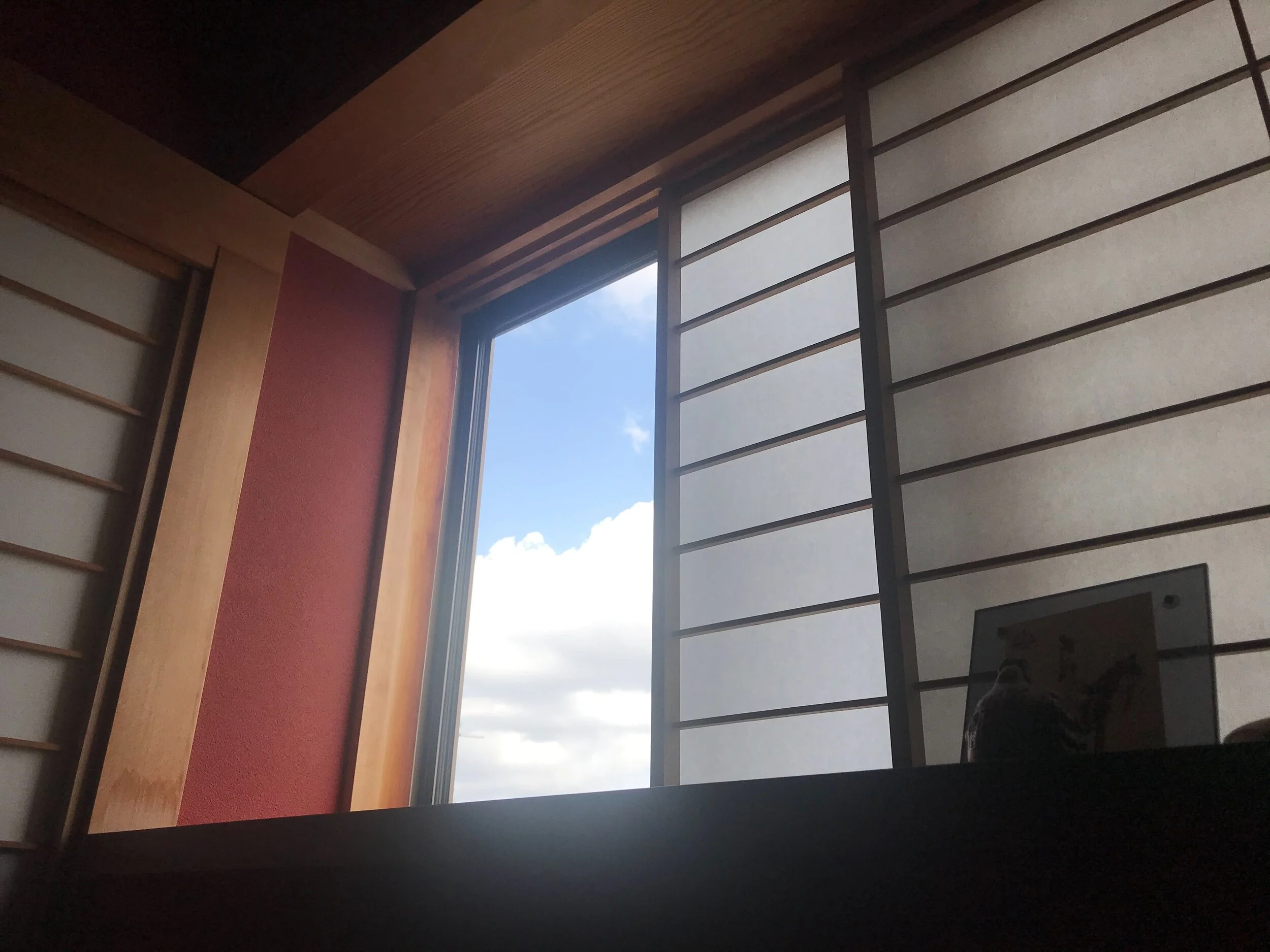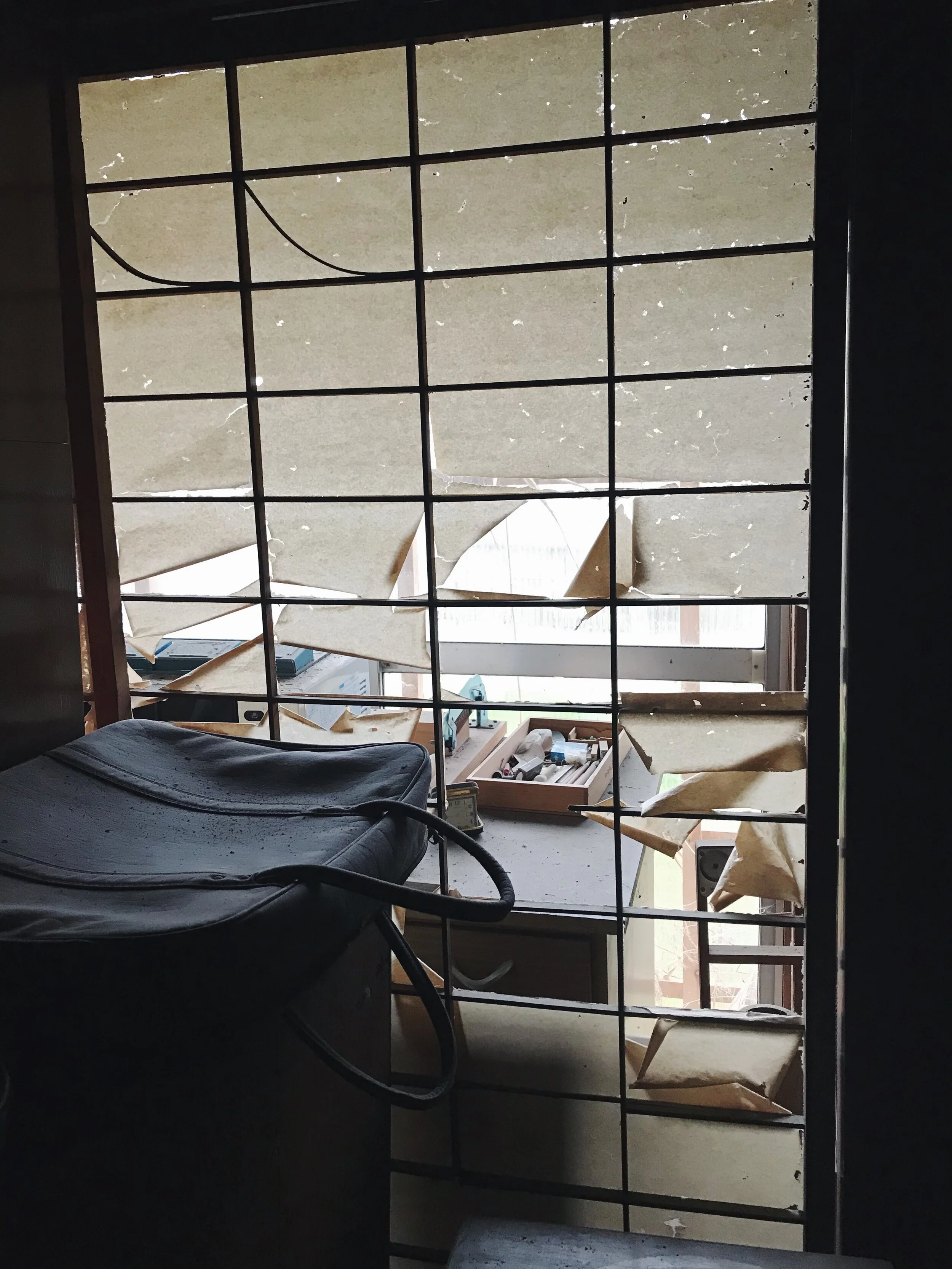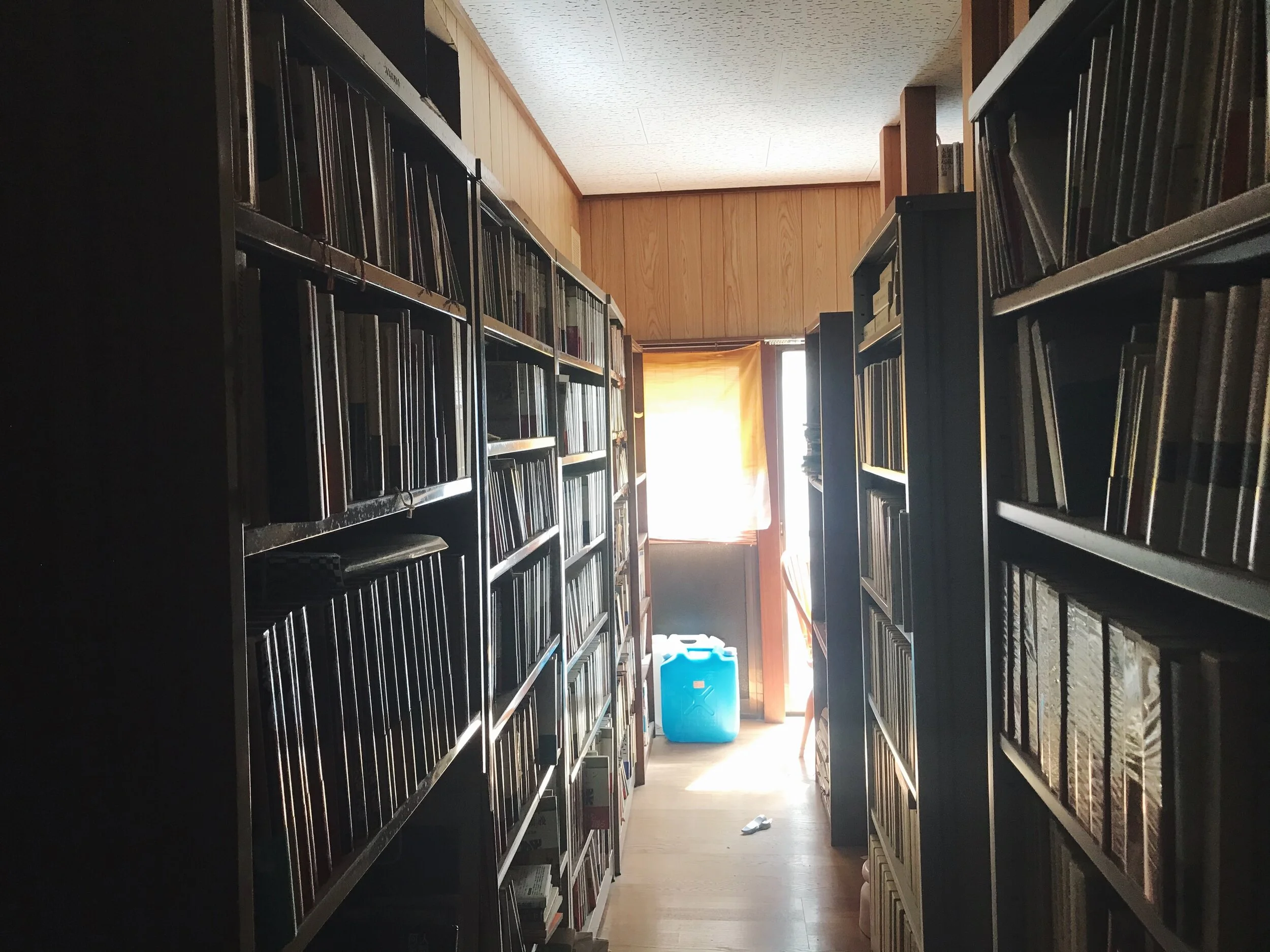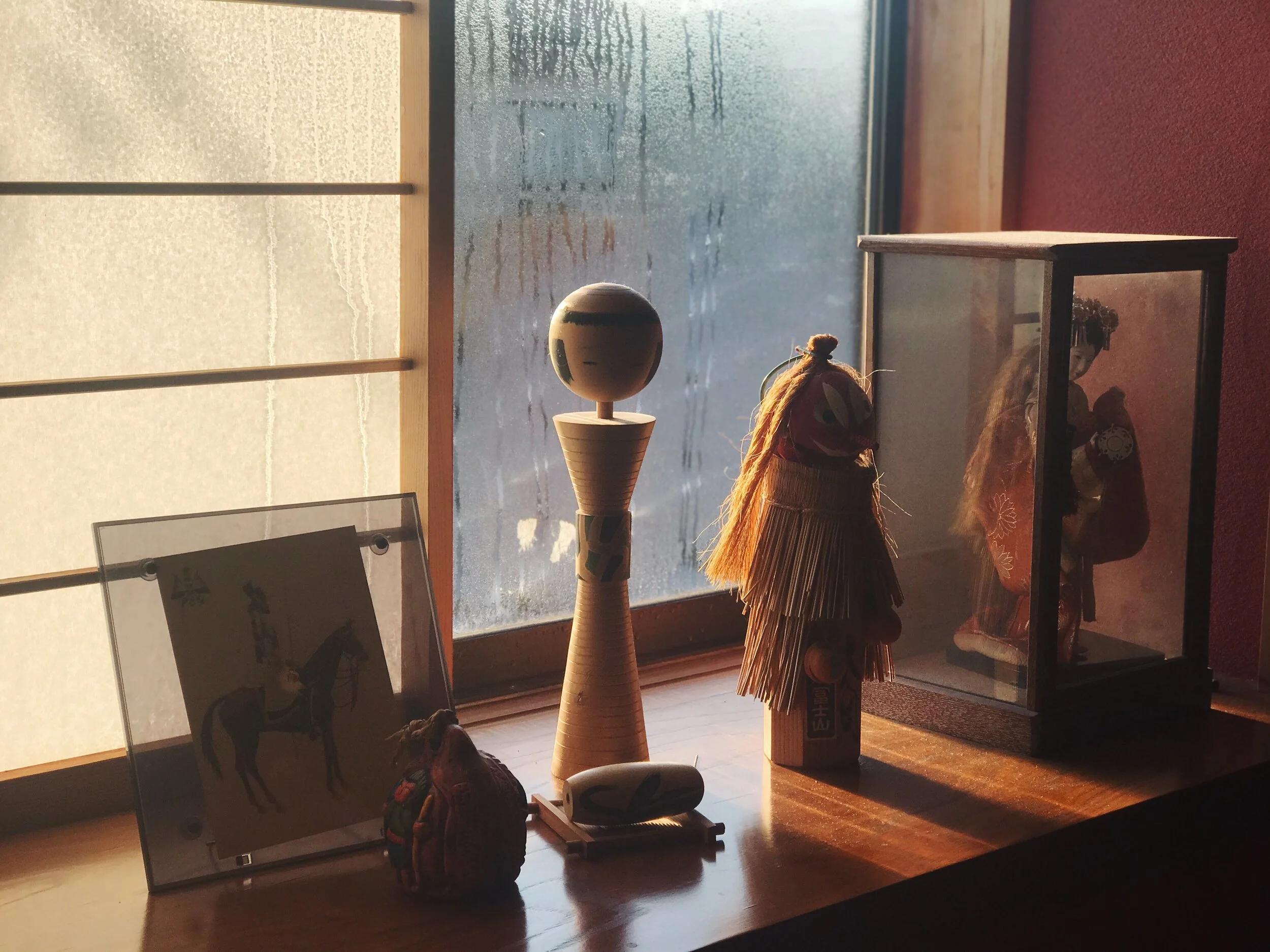the japanese houses of grandfather buddhist priest
I left Paris two weeks ago, a day before the lockdown, and have been living this endless time inside an old Japanese house of books, in a small town by the sea.
April 2, 2020 | Tsubata-Machi, Kahoku-Gun, Japan
Dear Y,
I have stayed inside this house so long that I feel like I was born here, amongst these books, and will die here, too. my friend’s grandfather was a sixteenth generation Buddhist priest who built this house; but, he never lived in it. no one did. he lived at his temple down the street, and this house was his personal library: two floors filled with dusty stacks of books, all decades old.
it is a house big enough for ghosts — full of dark corners, and rooms we never go in, filled with things we never touch. at night, my friend and I each have an entire floor to ourselves — bridged by a very steep, corner staircase. she lives downstairs and I live upstairs, in a tatami mat room with red walls, and two sliding screen windows. through one window, I can hear the rain and the wind at night. the other window does not open. we tried.
in my first seven days here, I feel like a child again. I am seven years old in the American South, in a long, ranch house full of shadows, engulfed in swaying pine trees, next to a sun-soaked cotton field. my days are spent roaming the house alone, making up games with the furniture, sifting through my parents’ things, room by room, standing on the shelves of their study — as if, hidden in their old books and videocassettes, there I would find clues to solve adult life, and all of its mysteries.
I was curious, and I was afraid. of dark corners and hallways. of closets filled with stories I didn’t understand, accruements of a past that wasn’t mine. a past, like a torn page from an unknown book. I was afraid of my questions, afraid of my imagination - wild, rich, and cruel - afraid of a house in the middle of no where — a house that was the world. it was life as theatre — mother, father, and brother. sun, pine, and shadow. my conscious and subconscious. the ceilings: like holograms of my dreams and nightmares. the walls: like four mirrors into the cavern of my mind.
twenty one years ago, I was seven in that house, and my friend was seven in this one. she was visiting Japan that summer, when her grandfather died, very suddenly, black robed in the heat of August, while performing ancestral rites for the busiest holiday of the year. after his death, her mother and sister stayed at the temple, but she didn’t want to sleep there. she was afraid — thinking, perhaps, that her grandfather’s body remained inside the endless labyrinth of shadows, scrolls, and sliding screen doors. so she had a cousin accompany her here, to this house of old books, to sleep in the same room she sleeps in now - directly beneath mine.
on my second day here, we walked past rice paddies, along a quiet neighborhood road to visit the temple. it used to be at the base of the mountain, my friend told me, before they took apart the wood and moved it here — piece by piece — closer to town, where they hoped to influence the petty criminals. like the house of old books, the temple was a world frozen in time: dusty boxes filled with cookware and plates; long, damp hallways like secret passages, old writing desks, a plastic baby’s rocker, folded futons in the corner, and paper from screen windows — torn and curling from the dark wooden frames, like broken moth wings in winter. daylight gazed in from there.
everything else was soaked in shadow. the inner rooms felt fluid; movable — you could enter one room from the sliding screen doors of all four walls, and there was little divide between the inside and outside, between home life and temple life. a door from the kitchen led to the main worship room, where kanji calligraphy lined the walls, and the tatami floors were expansive enough to seat a hundred people. the relics of the living spaces had the beauty of half-decay, but the alter was like all Buddhist alters I’ve ever seen — robustly ornate, shiny, and gold.
at the temple, I could feel her grandfather’s spirit, roaming those back halls, still very much alive — and I could feel the spirit of his daughter — my friend’s mother — before she decided she didn’t want this life, to follow sixteen generations of Buddhist priests - before she left for the United States and rarely spoke about her past, before she married an American man and moved to Oklahoma, before she gave birth to my friend and her sister, and brought them both back to Japan during the summers to visit their grandfather. I imagined her spirit as a child, growing up in these back rooms, running barefoot in grassy summertime. decades ago, when there was still a summertime.
and where, I wonder, is the house where my mother grew up in? which mountain is it near? where did she run barefoot? I don’t even know. I have never asked. the China of my childhood is long gone — the stars, all dead — let alone the China of her childhood, the sixties and seventies, starting an era when the new was good, and the old was bad - and burned.
so what happens to your grandfather’s books, I asked my friend. and she tells me: my mother tries to sell a bunch of them every time she comes back. but no one in japan wants old books — so sometimes she gives away whole boxes for thirty dollars, and it feels like such a waste. hearing this makes me feel sad, and in that moment, I wish I had a house big enough to salvage all the old books of the world, written in languages I can’t read, for all the pasts I never knew, could never touch, can never hold.
but I know it is futile. to try and make anything a container, a vessel for history, when the best I can do is to be a living window, through which time can flow. my body is my living place: my home, my library, my temple. and it too, shall pass.
I have stayed inside this house now for twelve days, in self-quarantine, and to my deep surprise, I don’t miss the outside world. at all. everyday, I find new passageways into the labyrinth of myself, new ways of being alone. and I guess I must be an adult now, because I am finally comfortable with darkness. I leave the mysteries of this house untouched, unturned. and over time, they slowly reveal themselves to me.
a few days ago, I found a slim book amongst the library stacks — a collection of haikus and travel writing by the 17th century Japanese poet, Basho — translated into English. it is one of the very few English books in this house.
so every night, I lay out my futon with five blankets on top, drifting to sleep with wind and rain beating on the screen windows, and every morning, I wake up in a cocoon of myself, the cold air on my face, fleeting sunlight on my tatami mat. I take the book of zen haikus — yellowed, stained, and faded in my hands — and with Basho as my guide, this is how I begin my day in the grandfather Buddhist priest’s house of old books. I read.
I hope you're safely cocooned, too, my dear friend, wherever you are.
goodnight,
kening
thank you for reading. you can support my writing here, by joining my patron’s program — where I’ll send you weekly essays from my nomadic life.







